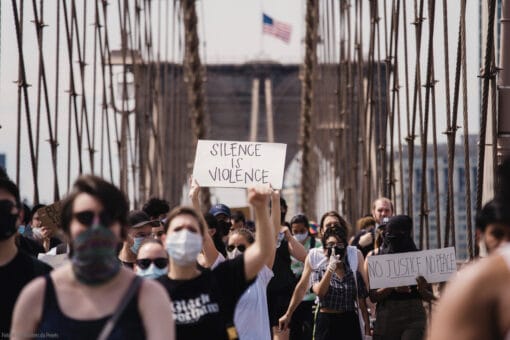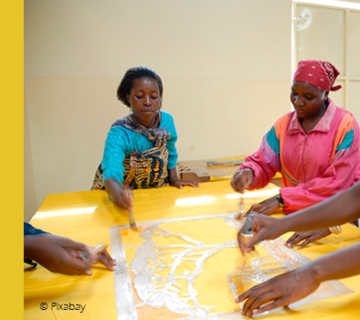As duas crises que estão abalando o país, pandemia e racismo, poderiam levar a um futuro melhor. Uma participação de Susanne Janssen, diretora da revista Living City.
 O racismo é um vírus que nunca foi erradicado dos Estados Unidos. Depois da Guerra Civil (1861-1865), a escravidão foi abolida no papel, mas ainda hoje pessoas negras e brancas não são tratadas da mesma maneira. A morte de George Floyd trouxe à tona o problema. Após os oito minutos atrozes em que Floyd implorou pela sua vida serem filmados, não era mais possível afirmar que a culpa fosse somente da vítima; esse vídeo, juntamente com outras tantas pessoas (não só afro-americanas) que se uniram durante as manifestações contra o racismo, representam um sinal que dessa vez havia algo diferente. Esperamos que o que aconteceu não acabe sendo somente uma onda de protestos, mas que traga uma verdadeira mudança.
O racismo é um vírus que nunca foi erradicado dos Estados Unidos. Depois da Guerra Civil (1861-1865), a escravidão foi abolida no papel, mas ainda hoje pessoas negras e brancas não são tratadas da mesma maneira. A morte de George Floyd trouxe à tona o problema. Após os oito minutos atrozes em que Floyd implorou pela sua vida serem filmados, não era mais possível afirmar que a culpa fosse somente da vítima; esse vídeo, juntamente com outras tantas pessoas (não só afro-americanas) que se uniram durante as manifestações contra o racismo, representam um sinal que dessa vez havia algo diferente. Esperamos que o que aconteceu não acabe sendo somente uma onda de protestos, mas que traga uma verdadeira mudança.
O papel da Igreja
Depois de alguns dias de silêncio, a Igreja se posicionou a favor daqueles que protestam contra o racismo. O cardeal de Boston, Sean O’Malley, escreveu que o homicídio de George Floyd “é uma prova dolorosa daquilo que é e foi para os afro-americanos o fracasso de uma sociedade que não está preparada para proteger a vida deles e de seus filhos. As manifestações e os protestos desses dias foram pedidos de justiça e expressões agonizantes de uma profunda dor emocional da qual não podemos nos distanciar”. A conferência episcopal dos Estados Unidos afirmou que o racismo é como o pecado original dos Estados Unidos, que acompanha o crescimento da nação e a impregna até hoje. Os espaços de reflexão estão se intensificando na igreja e na sociedade.
Os primeiros passos
Com o slogan “cortar os recursos”, pretende-se ir além de uma simples operação de reestruturação da polícia. A intenção é começar tudo de novo e dar vida a uma polícia mais sintonizada com os cidadãos. Nos últimos anos, fala-se muito da sua progressiva militarização, mas, na verdade, também deve-se dizer que muitos dos deveres que cumpre caberiam aos assistentes sociais.
Diferentemente dos casos de violência contra afro-americanos que ocorriam no passado, atualmente muitas pessoas procuram aprender, escutar e confrontar o passado, concentrando a reflexão nos problemas estruturais que permaneceram depois da abolição da escravidão e naqueles ligados à segregação, como as assim chamadas leis de Jim Crow e a lei sobre direitos civis de 1964.
Sim, porque encarar os preconceitos que estão dentro de cada um e os privilégios sociais de que gozam os brancos já é um primeiro passo. Dois autores, Ibram X. Kendi e Robin DiAngelo, afirmam que é necessário um passo que vá além de “ser uma boa pessoa”. É preciso, em vez disso, combater as estruturas de opressão. Ainda hoje, em uma situação cotidiana como uma blitz policial, a cor da pele pode fazer a diferença entre a vida e a morte.
A contribuição do Movimento dos Focolares
Em primeiro lugar, as comunidades do Movimento dos Focolares estão examinando se internamente há discriminação e racismo. O pensamento do Movimento sobre a justiça racial é um ponto de partida para começar um diálogo sincero entre nós e com as pessoas ao nosso redor.
Vamos dar espaço para os testemunhos dolorosos de racismo, mas também para as experiências de quem cresceu em um contexto de privilégio dos brancos e tenta começar um processo de reconhecimento dos próprios limites. Essas conversas não são fáceis, mas são necessárias para reconstruir relacionamentos verdadeiros.
“Se não ficarmos atentos, acabaremos aceitando os princípios da retórica comum sobre a diversidade que muitas vezes apoia os privilégios e acentua as diferenças”, afirma uma docente latina negra. Um acadêmico de mais de 80 anos contou como teve de aprender a ser mais aberto em sua vida, sobretudo quando uma de suas filhas se casou com um jamaicano: “Pensei que seus filhos sofreriam discriminação. Mas agora vejo como são um exemplo luminoso para muitas pessoas”.
O papel dos jovens
Os jovens estão na linha de frente e pedem uma mudança de mentalidade. Uma jovem mestiça diz: “Quero ajudar meus irmãos e irmãs para que sejamos mais ouvidos, do contrário, me arrependerei por toda a minha vida…”.
O slogan “Black Lives Matter”, que uniu tantas pessoas e encheu as ruas, também é alvo de polarização. Não raramente, nos deparamos com mensagens que procuram desacreditar quem luta por mais justiça, mas pouco a pouco nota-se uma mudança na opinião pública. De fato, muitas pessoas condenam o modo com o qual o presidente Donald Trump lidou com as crises recentes: a pandemia e o racismo estrutural. Por enquanto, o candidato do Partido Democrático, Joe Biden, tem uma vantagem nas sondagens de 13%, mas ainda é cedo para dizer como estará a situação em novembro, quando os estadunidenses irão às urnas.
Susanne Janssen, diretora da revista Living City


 Italiano
Italiano English
English Español
Español Français
Français




Why political ending? I hope Joe Biden will not be our next president.
I completely agree. Everyone talks about giving space to listen and have conversations. This is all the rage. TALKING WILL NOT SOLVE ANYTHING. We have heard the stories, seen the stories, experienced the stories. WE NEED ACTION. TALK IS CHEAP. And I have not seen one idea put into place that will stop this bigotry except do away with the police. Who will keep order? The social workers? Really? That is not a social workers job. They can’t even solve the problems of the people they are serving now, much less solve a whole counties problems.
Racism will never be abolished in any country until Planned Parenthood is abolished. It exists only to wipe the the black people from the face of the earth. Why does no one acknowledge this? Their existence is an sign to the black person that they are not wanted. There is more to the racism issue than people are willing to admit. The “communities” that Black Lives Matter have set up are existing in total chaos, with the people there killing each other, BLACKS KILLING OTHER BLACKS, and threatening anyone who attempts to offer services or help or interventions, be they black or white. Right now, all these protests are only about POWER, they are not about enabling people to rid themselves of racism.
There are a multitude of issues that need to be addressed in our society that would help the black person. The first is lack of fathers. Our society is overcome with the notion that fathers are not needed to raise children, thus it is ok to give birth and raise a child without a father, much less being married to the father.
This lack of a male role model has the child, boy or girl, going out to find one, resulting in them joining gangs. The family is the smallest circle from which society builds itself up on and if the smallest circle breaks, so does the whole. And our society is falling apart.
Education is another issue. We push our teachers to advance our children in school regardless of whether they have learned the materials necessary to go to the next grade. Teachers promote children who do not deserve to be promoted simply because they do not want to deal with them the following year. We have advanced the theory that the schools should be raising our children instead of the family raising the child. Bad teachers are left teaching because the school does not want to deal with the hassles involved in firing unfit teachers. This does not help the child. All it does is leave the child feeling inadequate and stupid because he/she cannot fulfill the requirements of the next grade. They lower their expectations of themselves, which in turn, lowers the expectations others have of them. Then they attempt to apply for a job and find they do not meet the qualifications or cannot uphold the standards expected from their employer to complete the job successfully.
Drugs are another issue. Whoever thought legalizing marijuana was a good idea? All it has done and will continue to do is dumb down our children and cause them to pursue a greater high, which means more and more dangerous drugs. And facts state that drug usage is higher in the black community than any other.
Which leads us to another issue. WHY is crime so high in the black neighborhoods? White people are not going down and causing harm to person and property in the black community. BLACK people are committing crimes against each other. This crime rate is statistically higher than any other ethnic neighborhood. Why is this so?
Finally, jobs. This relates back to education. The Federal government demands that their be equal hiring between races. However, if a black person is hired in a job and is unable to meet the company’s expectations, they are not fired because of the fear of the charge of “prejudice” being used against them. How do you think the co-workers of this person feel when they have to continuously cover up for this person? I acknowledge this is is not a situation which blacks are unique to, since this can happen with females also. Is this not fertile ground for resentment and prejudice to grow? This could have been solved by a child receiving a good education, which again is a vicious circle.
Someone needs DO something. STOP talking and start taking action of the above issues. Otherwise, we will be back in this situation in 10 years, if not sooner.